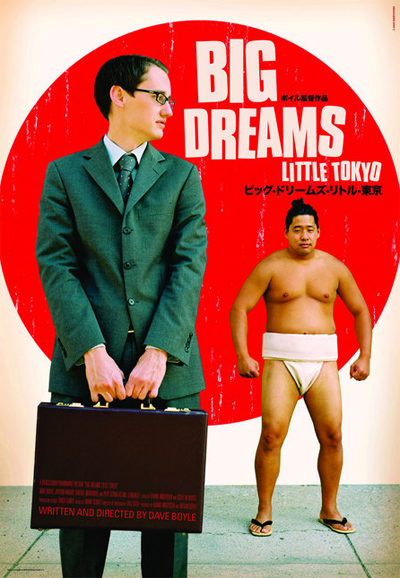Big Dreams Little Tokyo is not an anime, manga, or live action dorama. It’s an American indie film with a huge dash of Japanese culture references. Basically, fair game for review on this blog. Or so I declare.
Also, this review is based on an advance screener copy of the film. Apparently it’s going to be released in theaters and on DVD in early ’08. So you can’t watch this yet. Gomen.
Story:
Boyd (just Boyd) is a man on a mission. He’s got a book and he’ll go to just about any length to sell it. His book, “The Power of Words” is targeted at Japanese Americans who want to improve their English skills. Quite a niche if you ask me.
Boyd shares an apartment with Jerome, a Japanese sumo wrestler in training. Together they form an odd team. Boyd is giving Japanese lessons to Jerome while he trains (eats). They also go door to door selling Boyd’s book.
Along the way, they make friends with Andy, the Mexican who works at a Sushi restauraunt, and Mai, a Japanese nurse trying to improve her bedside manner. They all struggle with issues of ethnicity, identity, and overuse of gerund verbs.
Analysis:
Alright! Now it’s time for all those undergrad film theory courses to pay off! I used to be a film major, in case anyone is wondering.
Dave Boyle’s Big Dreams Little Tokyo is in essence, a film about characters struggling with their ethnic identity. Boyd is that dude in Japanese class that was way too into being formal with the teacher. He’s the classic weeaboo who wishes he was Japanese. Rather than come off as being annoying, however, he’s mostly sincere, even as he tells a Japanese person that he “doesn’t do white people.”
Boyd isn’t the only character struggling with these issues, however. Jerome is technically Japanese, though he doesn’t have much of his Japaneseness intact. At one (maybe the only) poignant part of the film, Jerome talks about how he was made fun of as a child for being Japanese, then later alienated by the Japanese around him for not being Japanese enough. Jerome’s character is mostly used for comic relief, however. It’s too bad since he could’ve had his own (real) subplot.
Despite all this talk about race issues, Big Dreams Little Tokyo is mostly a comedy. It’s a tricky blend of bilingual comedy that native English speakers who know Japanese would find funny. Luckily, I fit into that category. Most of it is in the form of Boyd being hypersensitive to Japanese culture, even moreso than the Japanese around him. For example, he cautions Jerome not to knock on a door four times, since “shi” is Japanese for “four” and “death.” Like most Japanese would notice, right?
Not all the jokes are language specific, thankfully. But I would recommend a few years in Japanese class to get all the jokes.
As far as the production itself goes, I’d say it’s a solid attempt by an indie filmmaker. I understand the budget for the film was probably fairly low. But I’ll point out what I noticed anyway! First off, the sound was a bit weird. The levels just didn’t feel right from scene to scene. It’s all in the post production. Speaking of sound, I thought the soundtrack appropriate. A lot of random sounds for a random movie.
I have mixed feelings about the acting. Boyd seemed a bit stiff at points (moreso than his character would or should have been). While he got the awkwardness down pat, I felt like some of the awkwardness was unintentionally bad acting… So either Boyd’s actor was an amateur, or a genius. I had no problems with Boyd’s Japanese, though. That dude’s actually pretty good (better than me, at least)! Jerome’s acting could also use some coaching. His inflections were sorta weird at parts, like he was just reading from a script. Mai, Andy, and the rest of the cast were all great, though.
The story itself also seemed to lack cohesion. There was a part where Boyd started a food delivery service, seemingly out of thin air. It was around this time that Mai suddenly vanished from the movie for a while, too. This kind of narrative hiccup is to be expected in an indie movie, though. I can forgive a little sloppy scriptwriting.
Conclusion:
Big Dreams Little Tokyo is a film that lives up to its title. I think Boyd’s story of persisting through his own company is probably similar to the creation of the film itself. How easy could it be to create a film about a weeaboo and his adventures in bookselling? It’s pretty much in a niche of a niche. But like Boyd himself, the movie has a lot of heart. I can’t see Big Dreams Little Tokyo gaining a lot of mainstream attention, but it doesn’t matter; I think Dave Boyle has already accomplished what he had set out to do.
Many thanks to Dave Boyle for sending me a screener of Big Dreams Little Tokyo!

2 replies on “Big Dreams Little Tokyo – Movie Review”
Nice review, sounds interesting.
What would you rate it?
I typically don’t like to give quantitative ratings, especially on things like indie films. I think you can tell from my review that I like the movie, with a few reservations on the acting and script details.